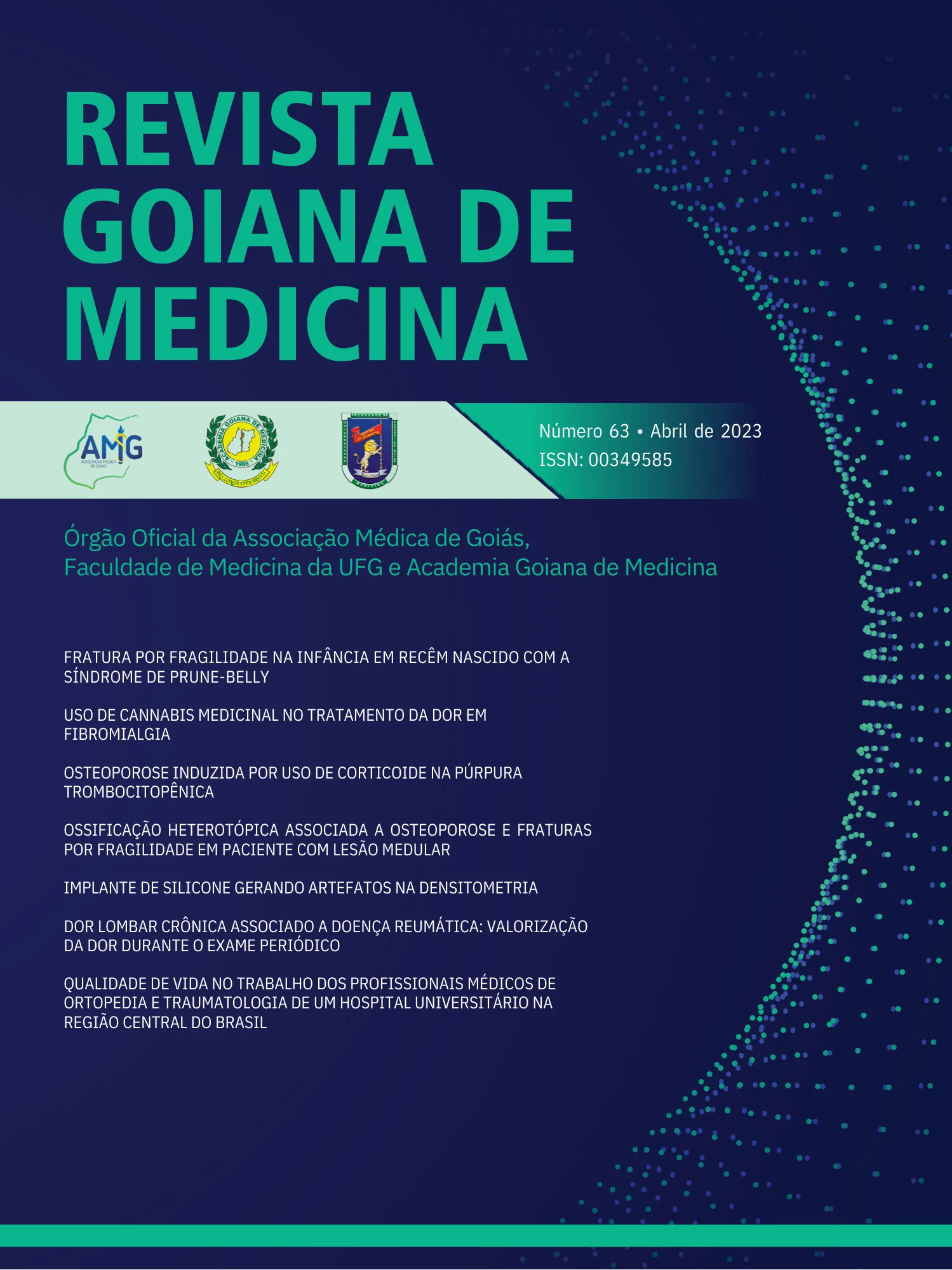Chronic low back pain associated with rheumatic disease
valuation of pain during periodic examination
Keywords:
Chronic low back pain, ankylosing spondylitis, biological therapyAbstract
Introduction: Chronic low back pain has been one of the diseases that most keep brazilians away from work. May be related to natural aging, stress and overweight. Pain itself can also be a symptom, whether of gynecological, kidney, intestinal problems or rheumatic pathologies. Ankylosing Spondylitis is one of the main diseases within the group of inflammatory joint diseases called spondyloarthritis, has the profile of a chronic and progressive disease that primarily affects the sacroiliac joints and the axial skeleton. The main functional losses occur during the first 10 years of the disease.
Objective: To report the case of a worker with chronic low back pain diagnosed with ankylosing spondylitis from the evaluation in the periodic examination to the result of the medical follow-up for two years using immunobiological medication.
Discussion: Chronic low back pain alters the patient's quality of life, causing different levels of pain and joint impairment, leading to physical, social, economic or psychological disability. Biological therapies have been the most recent modality of treatment for low back pain associated with inflammatory joint disease of rheumatic origin. The role of the Occupational Physician in the evaluation of the worker is fundamental, from the valuation of symptoms to the correlation or not with work activities, seeking ways to prevent health problems and certification of success in the treatment of diseases.
References
Silva LL, et al. Análise da prevalência de dor lombar associada à atividades ocupacionais: uma revisão integrativa de literatura. Brazilian Journal of Development, Curitiba, v.7, n.2, p. 11729-11743 feb. 2021
Helfenstein, M,J; Goldenfum, M,A; Siena, C. Lombalgia ocupacional. Rev. Assoc. Med. Bras. 56 (5) • 2010 https://doi.org/10.1590/S0104-42302010000500022
Teixeira, M. J. Epidemiologia clínica da dor. Rev. Med., v. 78, n. 1, p. 36-42, janeiromarço/1999.
Silva MC, Fassa AG, Valle NGJ. Dor lombar crônica em uma população adulta no sul do Brasil: prevalência e fatores associados. Cad Saúde Pública. 2004;20:377-85.
Souza, A. C.; Coluci, M. Z. O.; Alexandre, N. M. C. Sintomas osteomusculares em trabalhadores da Enfermagem: uma revisão integrativa. CiencCuid Saúde v. 8, n. 4, p. 683-90, 2009. Disponível em: < http://periodicos.uem. br/ojs/index.php/CiencCuidSaude/article/view/9707>.
Almeida, DC; Kraychete, DC. Dor lombar - uma abordagem diagnóstica. Rev. dor 18 (02) • Abr-Jun 2017 • https://doi.org/10.5935/1806-0013.20170034
Khan MA. Spondyloarthropathies. Rheum Dis Clin North Am 1992;18(1):1-276.
BRASIL. Ministério de Saúde. Relatório de recomendação de medicamento (Conitec) nº 640. Secuquinumabe como primeira etapa de terapia biológica para o tratamento de espondiloartrite axial em pacientes adultos. Brasília,DF, 2021.
Gouveia EB; Elmann D; Morales, MAS. Espondilite anquilosante e uveíte: revisão. Artigo de Revisão • Rev. Bras. Reumatol. 52 (5) • out 2012
Shinjo SK, Gonçalves R, Gonçalves CR. Medidas de avaliação clínica em pacientes com espondilite anquilosante: revisão da literatura. Rev. Bras. Reumatol. 46 (5), out 2006.
Yamada, K. A. et al. Escala de Confiança de Baixa Atividade (LoBACS): validade preliminar e confiabilidade. Phys Ther, v. 91, n. 11, p. 1592-603, 2011.
Brazil AV, Ximenes AC, Radu AS, Femades AR, Appel C, Maçaneiro CH, et al. Diagnóstico e tratamento das lombalgias e lombociatalgias. Rev Bras Reumatol. 2004;44(6):482-504.
Fochesatto Filho L, Barros E. Medicina Interna na Prática Clínica. Porto Alegre: Artmed; 2013.
Khan MA. The Spondylarthritides. 4.ed. Oxford: Oxford University Press; 1998.
Bennett AN, McGonagle D, O'Connor P, Hensor EM Sivera F, Coates LC, et al. Severity of baseline magnetic resonance imaging-evident sacroiliitis and HLA-B27 status in early inflammatory back pain predict radiographically evident ankylosing spondylitis at eight years. Arthritis Rheum. 2008;58(11):3413–8.


